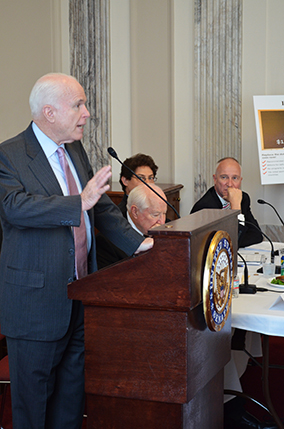
Sen. Joh McCain said switching to a dollar coin would be a small step towards helping ease deficit concerns.
WASHINGTON – Remember the Susan B. Anthony $1 coins of the 1970s? And the 1990s version – the Sacagawea coin? Consumer advocates and five senators think it’s time to give the $1 coin another chance.
But first — wipe out the dollar bill.
Eliminating the dollar bill in favor of the coin would save $13.8 billion over 30 years, consumer advocacy group Citizens Against Government Waste said Monday. At a Capitol Hill briefing, officials of the group said making a dollar note may be cheaper than a coin, but it lasts for approximately four years compared with 30 years for the coin, leading to substantial savings in printing and getting rid of old notes.
“It seems to me this one common sense remedy certainly won’t change the equation entirely. But even in this town, $5.5 billion or $13.8 billion is not chump change,” said Sen. John McCain, R-Ariz.
McCain has introduced legislation that would improve the circulation of $1 coins, along with Sen. Tom Coburn, R-Olka., Mike Enzi, R-Wyo., Mark Udall D-Colo, and Tom Harkin, D-Iowa.
“You have to phase out the dollar paper in order to make the coin successful,” said former Arizona representative Jim Kolbe.
The Government Accountability Office, a bipartisan congressional watchdog, has produced five reports in the past 20 years to support the transition to $1 coins. Its last report, in 2011, said the government could save $5.5 billion, a conservative estimate according to advocates.
Switching to a coin also would help the environment, the advocates said. The amount of waste generated in shredding of old notes is equivalent to the amount of trash that 345,000 Americans create in a year.
Americans have never warmed to dollar coins. The Susan B. Anthony and Sacagawea coins never became widely circulated. President Obama stopped the production of presidential coins in December 2011 to reduce costs. Nearly $1.5 billion worth of the coins are stored with the Mint.
Kolbe said vending machine owners and mass transit system administrators support the switch because it would make their transactions easier, but even advocates admit they have an uphill fight to replicate the success of countries such as Australia and England, which have eliminated small-denomination coins.
James Miller III, former director of the Office of Management and Budget, said a switch would help only the government save some money, not the consumer. He said there was empirical testing to show that consumers overwhelmingly rejected the use of the dollar coin, as it was inconvenient and heavy to carry.
